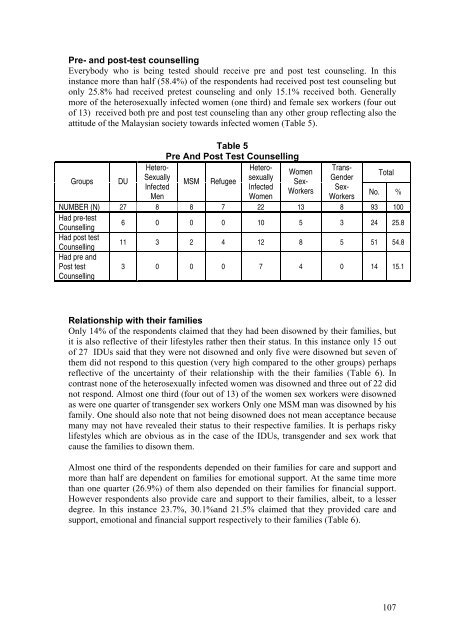Download this publication - AIDS Data Hub
Download this publication - AIDS Data Hub
Download this publication - AIDS Data Hub
Create successful ePaper yourself
Turn your PDF publications into a flip-book with our unique Google optimized e-Paper software.
Pre- and post-test counsellingEverybody who is being tested should receive pre and post test counseling. In <strong>this</strong>instance more than half (58.4%) of the respondents had received post test counseling butonly 25.8% had received pretest counseling and only 15.1% received both. Generallymore of the heterosexually infected women (one third) and female sex workers (four outof 13) received both pre and post test counseling than any other group reflecting also theattitude of the Malaysian society towards infected women (Table 5).GroupsDUHetero-SexuallyInfectedMenTable 5Pre And Post Test CounsellingHetero-MSM RefugeesexuallyInfectedWomenWomenSex-WorkersTrans-GenderSex-WorkersTotalNo. %NUMBER (N) 27 8 8 7 22 13 8 93 100Had pre-testCounselling6 0 0 0 10 5 3 24 25.8Had post testCounselling11 3 2 4 12 8 5 51 54.8Had pre andPost testCounselling3 0 0 0 7 4 0 14 15.1Relationship with their familiesOnly 14% of the respondents claimed that they had been disowned by their families, butit is also reflective of their lifestyles rather then their status. In <strong>this</strong> instance only 15 outof 27 IDUs said that they were not disowned and only five were disowned but seven ofthem did not respond to <strong>this</strong> question (very high compared to the other groups) perhapsreflective of the uncertainty of their relationship with the their families (Table 6). Incontrast none of the heterosexually infected women was disowned and three out of 22 didnot respond. Almost one third (four out of 13) of the women sex workers were disownedas were one quarter of transgender sex workers Only one MSM man was disowned by hisfamily. One should also note that not being disowned does not mean acceptance becausemany may not have revealed their status to their respective families. It is perhaps riskylifestyles which are obvious as in the case of the IDUs, transgender and sex work thatcause the families to disown them.Almost one third of the respondents depended on their families for care and support andmore than half are dependent on families for emotional support. At the same time morethan one quarter (26.9%) of them also depended on their families for financial support.However respondents also provide care and support to their families, albeit, to a lesserdegree. In <strong>this</strong> instance 23.7%, 30.1%and 21.5% claimed that they provided care andsupport, emotional and financial support respectively to their families (Table 6).107















